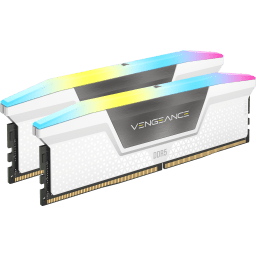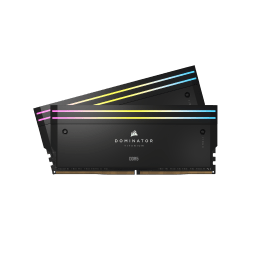작년에 저희는 디지털 파운드리에 연락하여 DDR4에서 DDR5로의 업그레이드가 게임 성능에 미치는 영향을 독립적으로 테스트했습니다. 평균 프레임 속도가 최대 31% 향상되는 등 결과는 분명했습니다. 최고의 성능을 위해서는 DDR5를 실행하는 것이 좋습니다.
올해 저희는 최신 DDR5 플랫폼에 대한 최적의 용량과 주파수를 결정하기 위해 보다 독립적인 테스트를 위해 다시 디지털 파운드리로 돌아갔습니다. 이번에도 커세어의 참여는 테스트에 필요한 하드웨어와 메모리만 제공하는 것으로 제한되었습니다. 실제 벤치마킹에는 관여하지 않았으며, 이 테스트는 디지털 파운드리의 매우 높은 기준에 따라 진행되었습니다.
테스트의 목적은 최근 인기 있는 게임에서 다양한 메모리 구성이 프레임 속도에 어떤 영향을 미치는지 조사하는 것이었습니다:
- 용량이 게임의 원활한 플레이에 영향을 주나요?
- 메모리 주파수는 어떻게 되나요?
디지털 파운드리는 디테일에 대한 탁월한 관심으로 이러한 질문에 답하기 시작했습니다.
테스트 구성
이번 테스트의 초점은 아니지만 DDR4와 DDR5 메모리를 비교하고 싶었습니다. 따라서 인텔 코어 i9-13900KF는 여전히 훌륭한 선택입니다. 인텔의 13세대 코어 프로세서는 약간 더 최신인 14세대 CPU와 거의 동일하기 때문에 기존 칩을 고수하고 DDR4 및 DDR5 테스트에 모두 사용했습니다. 결과는 플랫폼에 크게 구애받지 않으며, AMD 또는 인텔 CPU를 사용하든 비슷한 성능을 확인할 수 있습니다.
테스트에는 DDR4 성능을 평가하기 위해 MSI MAG B660M MORTAR MAX와 DDR5를 위한 ASRock Intel Z790 스틸 레전드 두 개의 마더보드가 사용되었습니다. 그 외에는 사용된 메모리와 그래픽 카드인 엔비디아 지포스 RTX 4090을 포함한 나머지 시스템은 동일하게 유지했습니다. 또한 두 플랫폼 모두 동일한 스토리지와 Windows 11 버전을 사용했습니다.

이번 테스트에 사용된 게임에는 최신 출시작과 주요 PC용 타이틀을 포함하여 Digital Foundry에서 업데이트한 게임들이 포함되어 있습니다: 발더스 게이트 3, 스타필드, 스타워즈 제다이: 서바이버, 드래곤즈 도그마 2, 마이크로소프트 플라이트 시뮬레이터. 이들 타이틀은 모두 PC에서 특히 최상의 설정에서 4K로 놀라운 화질을 자랑하는 인기 게임입니다.
모든 테스트는 4K(3840 x 2160)에서 가능한 가장 높은 설정으로 진행되었으며, 해당되는 경우 레이 트레이싱과 DLSS를 활성화했습니다. 전체 결과 분석은 벤치마킹 페이지에서 확인할 수 있습니다.
디지털 파운드리는 메모리 키트 간 비교를 위해 각 실행에 대한 영상을 녹화하여 자세한 프레임 속도 정보를 제공했습니다. 평균 프레임 속도가 가장 흥미롭지만, 1%의 최소 프레임 속도도 게임 플레이의 부드러움에 대해 많은 것을 알려줍니다. 두 경우 모두 프레임 속도가 높을수록 좋습니다.

PC 게임용 32GB DDR5-6000 C30 RAM이 필요합니다.
PC 게임은 고주파수 및 저지연 메모리를 선호합니다. 장기적인 PC 게이머에게는 놀라운 소식이 아닐 수 있지만, 성능과 가성비 사이에서 균형을 맞춰야 하기 때문에 정확히 어떤 키트가 가장 적합한지 찾는 것이 까다로울 수 있습니다. 현재 DDR5의 성숙도를 고려할 때, 6000 MT/s로 실행되고 CAS 지연 시간이 30인 32GB 메모리 키트를 선택하는 것이 좋습니다. 이러한 키트는 16GB DDR5-4800 구성에 비해 평균 프레임 속도를 최대 14%까지 향상시킵니다.
이를 위해 32GB VENGEANCE RGB DDR5-6000 키트를, LED가 필요 없는 분들에게는 32GB VENGEANCE DDR5-6000을 추천합니다. 게임을 즐기면서 더 까다로운 작업을 하는 파워 유저라면 동일한 키트의 64GB 버전이 더 나은 선택이 될 수 있습니다. 프리미엄을 원한다면 64GB DOMINATOR TITANIUM DDR5-6000 키트를 선택하는 것도 좋은 선택이며, 32GB 키트도 제공됩니다.
메인스트림 게이밍 시스템에서 점점 더 많이 사용되는 메모리 구성이기 때문에 비교를 위해 16GB의 DDR5-4800을 기본 구성으로 설정했다는 점을 강조할 필요가 있습니다. 따라서 단순히 더 높은 주파수에서 작동하는 메모리 키트를 선택하는 것이 아니라 더 높은 용량도 고려해야 합니다.

기본적으로 현재 최고의 성능과 최신 게임과의 최상의 호환성을 위해서는 32GB의 빠른 RAM이 필요합니다.
이는 다른 독립 테스터와 리뷰어들도 마찬가지입니다. 하드웨어 언박스는 게이머에게 얼마나 많은 RAM이 필요한가라는 질문을 제기했습니다 . 16GB 대 32GB 대 64GB를 비교하여 확실한 결론을 내렸습니다: "게임 시스템의 경우 32GB 메모리가 최적이며 가까운 미래에는 충분할 것입니다." 한편 TechSpot도 비슷한 질문을 던졌고 "정말 정답은 32GB"라는 결론을 내렸습니다. 16GB가 더 이상 최적의 용량이 아닌 이유에 대해 더 자세히 알아보고 싶으시다면 두 사이트 모두 확인해 보시기 바랍니다.
아직 DDR4 플랫폼을 사용 중이라면 어떻게 해야 하나요? DDR4 업그레이드 옵션을 다루는 별도의 문서가 있지만, 스포일러를 드리자면 32GB로 업그레이드하는 것이 더 원활한 환경을 위한 최선의 선택입니다.









